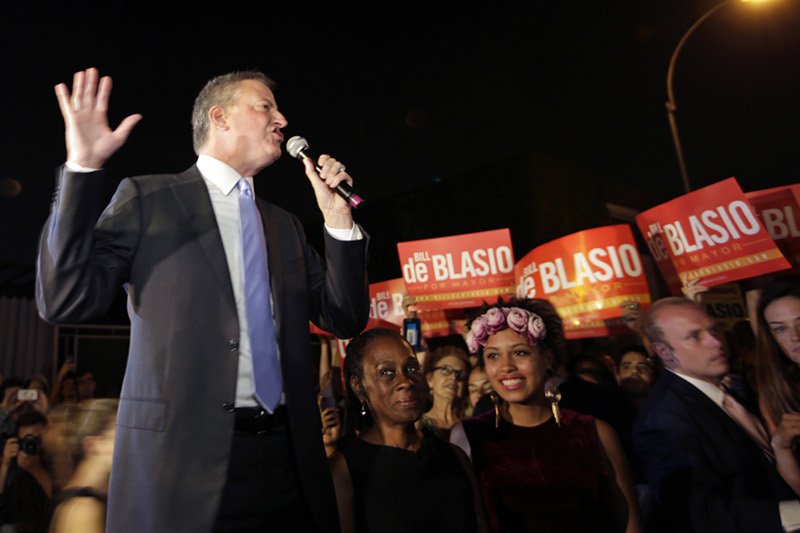NEW YORK (AP) — Public Advocate Bill de Blasio, who ran an upstart campaign pledging to fight New York City’s economic inequality, emerged as the surprising top choice in the Democratic mayoral primary, but could still face weeks — and another electoral fight — before becoming his party’s nominee.
The swirling, chaotic campaign to replace Mayor Michael Bloomberg, which featured Anthony Weiner’s latest sexting scandal and at least three lead changes in the polls, was fittingly plunged into uncertainty again after the Tuesday primary bled into early Wednesday.
With 97 percent of precincts reporting, de Blasio had about 40.2 percent of the total vote, which puts him a whisker above the 40 percent threshold needed to avoid triggering an automatic Oct. 1 runoff. If he cannot maintain that, he will face former city Comptroller Bill Thompson, who has 26 percent, for a potentially grueling three-week, one-on-one showdown, with the winner advancing to face Republican nominee Joe Lhota in the general election.
But it may take a week or more before it is known whether that battle will be fought at all.
The campaign will take a pause Wednesday as the city stops to observe the anniversary of the Sept. 11, 2001, terrorist attacks. Later this week, election officials will recount all the ballots cast Tuesday. It will likely take until early next week before they tabulate an additional 30,000 or more votes as absentee ballots arrive by mail and paperwork comes in from voters who had problems at the polls.
City Council Speaker Christine Quinn, the early frontrunner who was seeking become the city’s first woman and openly gay mayor, finished third at 16 percent, followed by current city Comptroller John Liu at 7 percent and Weiner at 5 percent.
De Blasio, who was flanked by the interracial family he made a centerpiece of his campaign ads, made no mention of the potential runoff in his speech to supporters late Tuesday.
“We are better as a city when we make sure that everyone has a shot,” de Blasio told the raucous crowd. “We begin tonight.”
With de Blasio so close to 40 percent, Democratic leaders may pressure Thompson to drop out of the race in the name of party unity. Exit polling shows that de Blasio would handily defeat Thompson in a runoff, 52 to 34 percent, with 9 percent saying they would stay home.
But Thompson made it clear Tuesday he would compete in a potential runoff.
“Three more weeks! Three more weeks!” chanted Thompson, the party’s 2009 nominee. “This is far from over.”
De Blasio, more than any other candidate, benefited from the rapid fall of Weiner, who was leading in the polls before he was felled by his old demons.
A gossip site revealed that Weiner used the online handle Carlos Danger to continue to send X-rated messages to women even after he resigned from Congress in 2011 for the similar behavior.
His ill-fated campaign had two final embarrassments in its last minutes: one of his online paramours, Sydney Leathers, tried to crash his primary night rally and Weiner was caught making an obscene gesture at reporters as he was driven away.
Another scandal-scarred politician, Eliot Spitzer, who resigned as governor in 2008 after paying for sex with prostitutes, tried to run a self-financed campaign for the lesser office of city comptroller. But his distant, television-heavy campaign struggled to connect with voters and he lost to Manhattan Borough President Scott Stringer.
In the mayoral race, de Blasio’s rise was as sudden as it was unexpected.
Not even two months ago, he was an afterthought in the campaign but surged thanks in part to an ad campaign that featured his 15-year-old Afro-sporting son Dante, who became such a cult figure that the campaign embraced the Twitter hash tag #fromentum.
The exit polling showed the appeal of de Blasio, who holds the position of the city’s official watchdog, to be broad-based: He was ahead in all five boroughs; was even with Thompson, the only African-American candidate, with black voters; and was ahead of Quinn, the lone woman in the race, with female voters. He also led Quinn among gay voters.
The voter interviews were conducted by Edison Media Research for The Associated Press and other news organizations.
The winner of the mayor’s race in November will assume the helm of the nation’s largest city at a critical juncture, as it experiences shrinking crime rates yet widening income inequality, and as the nearly completed One World Trade Center building symbolizes a new era after the terrorist attacks of 2001.
Nearly three-quarters of Democratic primary voters said in the exit polls that the next mayor ought to move away from Bloomberg’s policies.
And De Blasio, 52, has fashioned himself as the cleanest break from the Bloomberg years, proposing a tax on the wealthy to fund universal pre-kindergarten and changes to city police practices he says discriminate against minorities.
On the Republican side, the candidates largely pledged to follow Bloomberg’s lead. Lhota, former head of the region’s transit agency and a one-time deputy mayor under Rudolph Giuliani, led the race from start to finish, fending off the self-financed bid of billionaire grocery store magnate John Catsimatidis.
___
Follow Jonathan Lemire at http://www.twitter.com/JonLemire
Copyright 2013 The Associated Press. All rights reserved. This material may not be published, broadcast, rewritten or redistributed.






